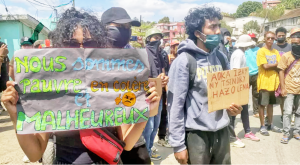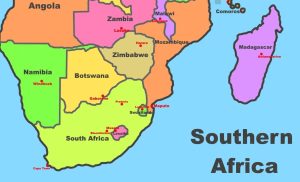
Workers, Soldiers, Students Need Communist Revolution, Not Regime Change here ♦ Letter: Everywhere, in Any Language, Workers Need Communism here ♦
Workers, Soldiers, Students Need Communist Revolution, Not Regime Change
October 19— “This is the first step to be free from misery,” said a Malagasy student. The Malagasy ethnic group is 96% of Madagascar’s population.
“If the country’s next leader is like [deposed president] Mr. Rajoelina,” declared another, “we will rise again.”
To free themselves from misery, the masses will surely need to rise again. Not just against a corrupt regime, but against capitalism. Against imperialism. For communism.
“Gen Z” Malagasy youth were inspired by protests in Nepal. They poured into the streets of the capital, Antananarivo, and other Madagascar cities earlier this month. They targeted government corruption, growing inequality, and the deteriorating standard of living.
Malagasy boys are recruited to work in dangerous Madagascar rare-earth mines. These mines are controlled mainly by the British Australian giant Rio Tinto and by Chinese companies like CNMC.
The young workers suffer the poisonous effects of polluted water and air. Then unemployment pushes them to Antananarivo. Many joined the “Gen Z” protests.
The western capitalist press has focused on university students. But these young industrial workers are waging a class struggle. Madagascar’s largest union, the Malagasy Trade Union Solidarity, joined them. Madagascar’s rulers could no longer rule in the old way.
So Col. Randrianirina led his elite CAPSAT military unit to join the uprising. President Rajoelina fled. Randrianirina, backed by the military, became president.
But what will change for the 80% of Madagascar’s people who live in miserable poverty? For those young miners? Not much. Local capitalists will continue to collude with imperialist powers to exploit them.
Already the rebellious youth are angry at Randrianirina’s new prime minister, who was deeply complicit in the old regime.
Madagascar: Chained by Imperialism
The Dutch East India Company colonized South Africa in the seventeenth century. Its Cape Colony was a stop on the route to present-day Indonesia. In 1652, these capitalists began enslaving tens of thousands from Madagascar. Many South Africans are their descendants. Many helped topple Apartheid.
Since the late nineteenth century, banks and other financial institutions have dominated world capitalism. Imperialist powers, those with the wealthiest and best-armed ruling classes, strangle the international working class. Their foreign direct investments enable them to extract maximum profits from impoverished workers.
Critical Rare Earths: Major Source of Conflict
China, France, and the Netherlands (still) are the main investors in Madagascar. Others channel investments through nearby Mauritius. The big prize is rare earth minerals. The Ampasindava project is one of the largest troves of rare earths outside of China.
China’s relationship with Madagascar’s rare earth minerals is a contradiction. It involves both collaboration and competition.
Chinese state-owned companies have major direct investments in Madagascar’s mines. China dominates in the dirty but profitable work of refining rare earths. It has been processing rare earths from Australia. A new US-Australia pact could change this. But China could do the same with Madagascar.
Or Madagascar could potentially supply rare earths to US capitalists and others trying to avoid China’s dominance of this resource.
British-based Harena Resources plans to develop Ampasindava. Last year, US-based Energy Fuels acquired Base Resources and its Toliara heavy mineral sands project in Southwest Madagascar. Energy Fuels plans to process these sands in Utah (US).
Our Answer Is Communism
Inter-imperialist conflict and class struggle are intertwined. For example, rare earths production has declined in recent years, facing strong opposition from farmers angry at the mines’ destruction of their communities.
Ex-president Rajoelina had close ties with the Chinese rulers. The new president Randrianirina is said to lean instead toward Russia.
The Malagasy “Gen-Z Tonga Saina” group has correctly warned that the new military government “protects the interests of the system, not the people.”
There were massive protests in Mozambique last year. In response, the Chinese government ‘forgave’ 14% of the Mozambique debt of $10 billion. They also ‘donated’ $10 million of the wealth they had stolen from Mozambican workers for “upliftment of the youth.” Something similar could happen in Madagascar.
But young workers from both countries will continue to live in dire conditions. Those who migrate to South Africa (even legally) will still be attacked by ultra-racism, xenophobia, and gang violence.
Comrades in South Africa will continue the process of recruiting more of them to our International Communist Workers’ Party. And to build ICWP collectives in both Mozambique and Madagascar.
Everywhere, in Any Language, Workers Need Communism
We read the draft of your Madagascar article with other comrades from Mozambique. We live isolated in Gqeberha, and we face severe racism and gang violence.
But we met an excellent comrade who introduced us to ICWP. He is the only person who mixes with us, talks to us, and is always sympathetic to our difficulties. It was because of him that we read Red Flag. But we don’t speak English. He taught us to visit the website and read it in Spanish. We translate it into Portuguese. Then we communicate with the comrades in our broken Xhosa.
The Madagascar article helped us a lot because we did not know much about its colonial past. We will send it to the comrades who will spread our paper there.
I want again to thank the ICWP comrade for his consistent help. A few years ago, one of our friends was brutally killed in gang violence. The fallen friend was in the coffin for two weeks because we had no money to transport him to Mozambique. The ICWP comrades helped to raise some money.
In gratitude for this kind gesture, we always want to invite comrades to Mozambique. We will have comrades from South Africa, Mozambique, and Madagascar. We request more articles about Mozambique that will inspire people to turn Gen-Z into a fight to end daily violence and misery.
—Comrades from Mozambique in South Africa


